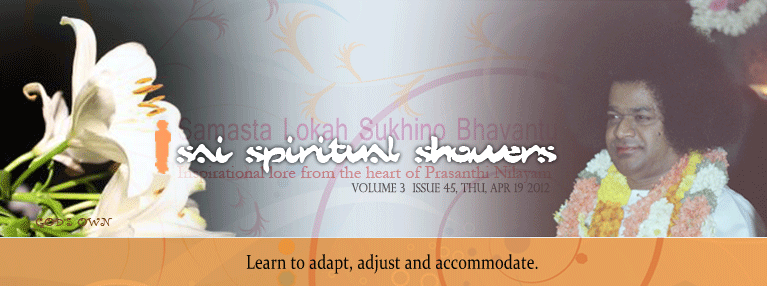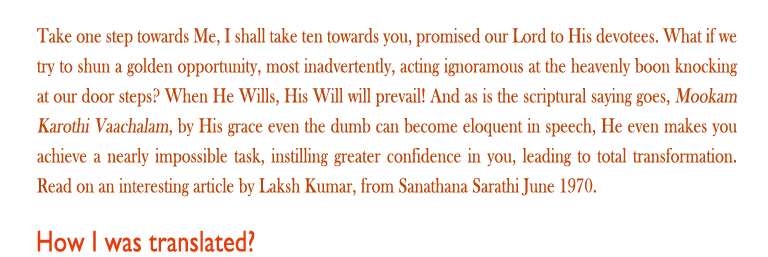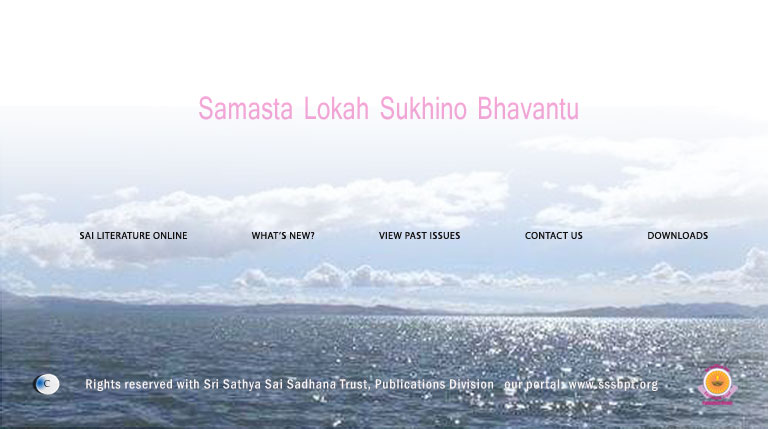Years ago, I had read the article on Baba, in the 'Illustrated Weekly' and had, at once, rejected the whole description as "trash”, sentimental and useless. I used to receive those letters, which most of us get, where the sender appeals to our greed, saying that if we send nine or eleven similar letters to our friends, we will receive, on the ninth day, some good news! A threat is also mentioned therein, that, 'if we do not continue the chain, we will suffer loss or dishonour.' I used to throw these letters in the waste paper basket, without reading them. In September 1969, someone sent me three books on Sathya Sai Baba. I never tried to know who had sent them; I never cared to go through the contents of the books—for, I had such set ideas and attitudes about Baba.
I turned the pages of the books; my eyes fell upon a photograph of Baba; I felt there was nothing worth reading in them. I placed them, in an obscure corner of my bookshelf. This was a unique act: for, I did not, as was my wont, throw them away or give them away to someone. As Divisional Inspector of Schools over a district, I keep receiving books from all over the country; I read the ones I like and pass them over to the library of some school. But, in the case of these three books I did not read them, nor did I pass them on. I kept them, with me!
I have a habit of waking up from bed about an hour after midnight to read books for about two or three hours, and going back to bed for further sleep. This was a habit I cultivated while at college; it has stayed with me, ever since. Though the compulsions of study are absent, I still get up at about 1 a.m. and study some book or other for about two or three hours.
I am studying these days, the Ashta-dhyayi (Eight Chapters) of Panini, the Sanskrit Sabdanusasanam, one of the most celebrated works on linguistics, written several hundred years before Christ was born. Panini is the greatest architect of language the world has produced. His book not only deals with the Sanskrit language, but, it is a text illustrating his linguistic methods. The world's linguists have wandered for two centuries fruitlessly in the jungles of language study; at last, they are returning to Panini and seeing light. Panini is an absorbing and fascinating writer, though his work is by no means easy to understand.
It was early September 1969. One night, I woke and took my Ashta-dhyayi and went into the dining room, so that the rest of the household might not be disturbed. It was strange that I could not concentrate that night. I closed the book and went out of the house. The time was one o' clock, then. Wonderful peace was reigning on Khosa that was sleeping quietly. Only a few lights flickered here and there. A nice cool breeze was blowing softly and I felt refreshed enough to walk in and resume the study.
But, when I sat down and started reading, I found I could not. For a moment I thought why I could not concentrate, when, lo and behold, just by my side sitting on a chair near the dining table, near where I was studying, I saw a figure in flowing red robe, with hair typical of Sathya Sai Baba. The instinctive reaction of anyone when he sees a stranger in one's house, at dead of night, is, of course, to shout for help. But, I felt no such reaction. On the other hand, I felt great pleasure, an unearthly peace filling me, on seeing Baba. I had never thought of Him, nor, had I desired to see Him, even in my dream of dreams! But, He was there before me. Even on seeing Him, I was not ready to accept Him. Before I could ask Him Who He Was, I heard His clear sweet voice, saying to me, in a reassuring tone, "Do not be afraid; I Am with you.”
He repeated this twice and I felt really more assured. Still, the question remained who He Was. I was just about to put that question, when I heard His voice, again, “I sent you some books!" At once, I associated the books, with the books I had received on Baba, and without even thinking for a moment, I replied, "Yes, I have received some books" I was about to say more—(I always like to say more and more—my friends know that I seldom stop short, but, always talk on and on—though I have often felt, unnecessarily) but, Baba then said, "Read them.”
I said, "There is nothing in them, it is all trash. There is nothing I can read in them,” But, Baba persisted: "Still, there will be something in them; at least, read.” And, He smiled—a smile I can never forget. I said, "I will,” and got up, and went to the shelf. When I returned with the books, Baba was not there.
I started reading those books. I found therein all the wisdom our books on philosophy contained, described through actual experience by Baba. I found in them the conviction of realisation. Let me make it clear that I have never been drawn towards religion. I recognise three compartments in religion—philosophy, ritual and action. Of these, only philosophy has attracted me from long ago; I had read almost all books available about Eastern and Western Philosophy, and found them mere words, without the sublime experience of what they imply. Baba's words were, however, convincing!
After a few days, I was again reading Panini in the small hours of the night and again feeling that I could not concentrate on the work. I saw Baba again before me in the chair. He asked me. "You have read the books." It was not a question; it was a statement of what He already knew. It forced me to say, "Yes. I have.” "You liked them,” Baba said, with the same assurance of knowledge. "Yes, some nice things have been described in them,” I said. "I knew you would like them; now ... translate,” Baba said, with that charming smile of His, and vanished. Translate! What did it mean? From one language to another? Or, from the head to the heart? I took Him to mean that I should translate the books, into Hindi or Adi; I took the literal meaning. I started translating the books into the Adi language of the North Eastern Frontier Agency.
Friends who know Adi will agree that it is very difficult to express in Adi abstract philosophical ideas. However, by the Grace of Baba, I could do this. Still I used to stop the work of translation, in a few places, awaiting guidance. Psychologists might interpret my behaviour as ‘an escape from a difficult pursuit like the study of Panini;' they would have been right but for the fact that I am still continuing my study of Panini and what is more, finding it easier and easier, day after day!
Baba came to me a third time! He asked me, "You have started translating.” This time, His voice came in the midst of my absorption in Panini! I raised my head and saw Baba in His full glory and replied, "I cannot do it; it is very difficult.” But, Baba said, "You can do it; you have done it; do not get too much fixed up in words; what is worth doing is difficult.” Then, Baba disappeared. This assurance gave me further courage; I continued obeying His behest; I have now not only translated the books into Adi, but, I have translated myself, in thought, action and feeling.
This is the story. On hearing about this, friends ask me, "What more do you desire? You are indeed lucky that you have seen Baba and that too so often." I reply that I am indeed blessed and that I do not desire anything. The 'I' is submerged in Baba. I desire not. Baba wishes, Baba orders, Baba gives me strength to do what He wants to be done. Some say, "You may leave this material world soon!" But, can any man do so, without Baba's express Will? If Baba wishes so, well, man will.
This experience has given me control over the ego and over hatred of others. I am now afraid of talking slightingly of subjects I do not know or beyond my actual experience. Miracles are happening to me, every now and then; if I describe them, this letter will grow too long. Let me conclude with ... SATHYA SAI JAI JAI.
|







